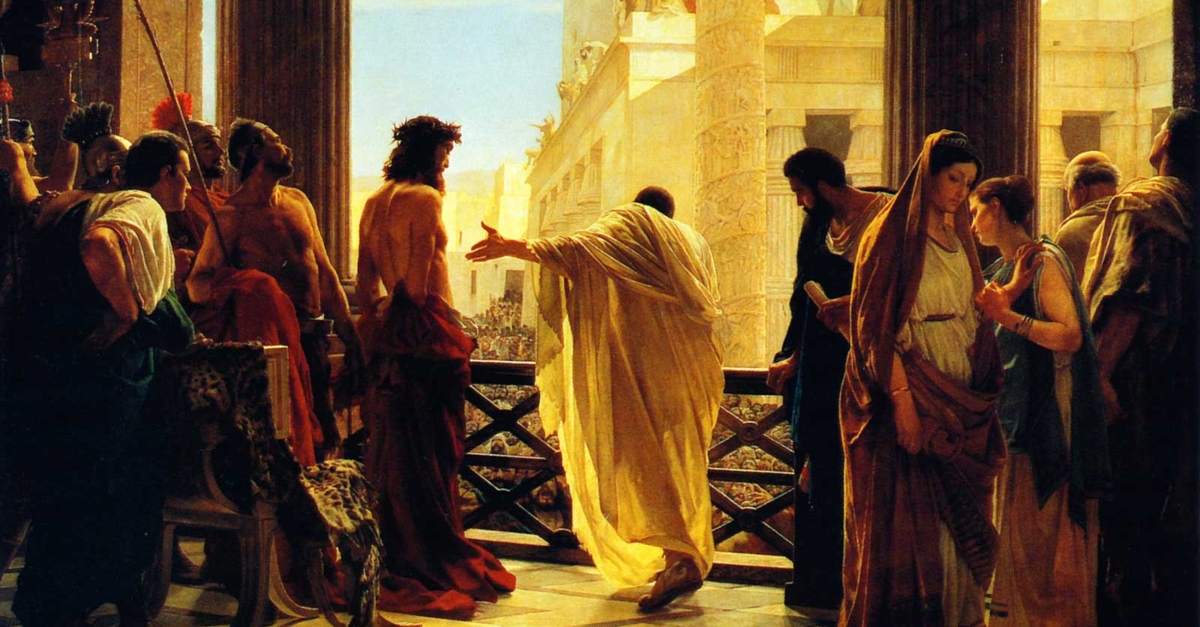The Cautionary Tale of the Sanhedrin

The Sanhedrin was the highest council over the religious, political, and social aspects of Jewish life in Biblical times. The Merriam-Webster dictionary defines Sanhedrin as, "the supreme council and tribunal of the Jews during postexilic times." The name originated from the Greek “sunedrion” and later, in Hebrew, it changed to Beth-Din or "house of judgement." It did, in fact, become the center of justice for the Jewish population, often wielding influence second-only to the governing powers in place.
Sanhedrin councils were eventually put in every Judean town, each with a set number of men that included scribes, elders, lawyers and other priests. The city of Jerusalem's council was the largest. Though similar to the others in structure, this "Greater Sanhedrin" as it was called, decided on matters connected to the Temple and served as the Jewish supreme Court. The leader there was called the Temple High Priest.
Most believers know about the Sanhedrin through the Gospel accounts of Jesus' trial and crucifixion, and their hurried rush to judgement. Long before that, though, various members questioned and tested Jesus, hoping to expose Him as a false prophet. Their zealous observance of the Law and desire to retain power led them to try to silence this challenging voice.
I used to push past Scripture sections about the Sanhedrin as quickly as I could because those accounts stirred up anger and upset in my spirit. But by learning about their history, I've been able to get a sense of how God used them to further His amazing plan for us, and some cautions for my own faith as well.
Who Were the Sanhedrin?
Most scholars state that the Jerusalem Sanhedrin consisted of two main groups.
The Pharisees were the experts on Jewish law. They followed the oral law that Moses received from God. This group believed that a Messiah was coming, and also in life after death. As the lawyers of the Temple, part of their work was to diligently check what any new prophet was teaching and to make changes they thought appropriate.
The Sadducees were the more aristocratic of the two. For them, the rituals of the Temple were the main priority. They did not believe in oral traditions, but wanted strict adherence to the written law. They did not believe in an afterlife. Driven by the need to keep their status, many were more willing to cooperate with the ruling powers, even incorporating some of their beliefs.
Both of these groups considered themselves to be morally and spiritually superior, the appointed shepherds of the Jewish people.
The History of the Sanhedrin
The Jerusalem Sanhedrin first appeared while the Greeks, namely Antiochus the Great, ruled over the Jewish nation from 223-187 B.C. During this period, the council and high priests were given authority to decide most religious and civil matters. Later, around 47 B.C., the Roman empire had taken control. They installed a local governor over the Jewish population, giving the Sanhedrin increased prestige.
At the time of Jesus' birth, the Sanhedrin had evolved into the supreme governing body for the people. Able to pronounce and carry out sentences for nearly every type of offense or crime, they held sway over the life of Jewish citizens.
In the years 66 to 70 A.D., the high council led an unsuccessful revolt against Rome. During the struggle, another group called The Zealots took control, leading the Sanhedrin to dissolve. Though attempts have been made since to revive it in other towns and territories, the Sanhedrin have faded.
All towns in Judea, whatever size, had a Sanhedrin. In these locations, the councils had 22 members plus a High Priest. The Great Council in Jerusalem, though, had 71 members plus the High Temple Priest. Some believe this number was based on a passage about Moses in the Book of Numbers:
"Bring me seventy of Israel's elders who are known to you as leaders and officials among the people. Have them come to the tent of meeting, that they may stand there with you. I will come down and speak with you there, and I will take some of the power of the Spirit that is on you and put it on them. They will share the burden of the people with you so that you will not have to carry it alone" (Numbers 11:16-17).
Duties of the Sanhedrin
The Jerusalem Sanhedrin met almost daily in a hall connected with the Temple. Along with observing the rituals of the Law, the members legislated in matters regarding the temple, such as proclaiming fast days and regulation of the Jewish calendar. Other areas of jurisdiction included appointing judges, applying taxation, and issuing decrees in specific local cases.
Watching over the Rabbis and other teachers was another important duty. They walked about the city, engaging in sometimes heated debates, to make sure their laws and traditions were being correctly observed. At the start of His public ministry, Jesus probably looked like just another young prophet - neither party in the Sanhedrin was very concerned. But as they heard more about Him, the Pharisees decided to go and watch what He was doing.
Believing they were in the right, most members felt justified in trying to quell the disturbance Jesus was causing. However, they deliberately exceeded their authority by calling for the death of an innocent man. After the crucifixion of Jesus, the Sanhedrin continued their quest to stamp out the “movement’ He had created, hoping to restore the peace.

Photo credit: Wikimedia Commons/Public Domain Image/Antonio Ciseri
The Sanhedrin in the Bible
The Gospels contain vivid accounts of the Sanhedrin's trial of Jesus. But other places in Scripture mention them and their handiwork as well.
The Book of Acts, for instance, shows that the Sanhedrin were actively pursuing Jesus' followers. There are accounts of:
- Their violence against the Apostles, such as the stoning of Stephen (Acts 7)
- Their hearing testimony from the Apostles, like Peter's words (Acts 4)
- The Apostle Paul on trial in their council meeting hall (Acts 23:6-11).
Jesus Taken before the Sanhedrin
After Jesus performed the miracle of resurrecting Lazarus, the Sanhedrin knew that something must be done about Him. Jesus' popularity was becoming a threat to the Sanhedrin's status in the community. The members were afraid His teaching was sparking disorder among the people, and would cause trouble with the Roman government. So, the council leaders decided Christ must be eliminated.
The first step was to arrest Him, so temple guards were sent out to bring Him in. But the guards came back empty-handed, reporting that, "No one ever spoke the way this man does" (John 7:46). Finding a willing informant in the disciple Judas Iscariot, they tracked Jesus down and took Him into custody.
Jesus was then brought before a succession of people who questioned Him into the night. They wanted Him to incriminate Himself, but were disappointed. He stood before High Priest Caiaphas, a smaller group of the Sanhedrin, and Roman officials, withstanding abuse and testimony by false witnesses. Despite the lack of evidence, Jesus' fate was decided before the whole council assembled the next morning.
The council accused Jesus of several violations of the Law include healing on the Sabbath, threatening to destroy the Jewish Temple, sorcery and exorcising people by the power of demons.
Even after all the questioning and supposed evidence, the council couldn't find enough to support a charge of death against Jesus. Finally, they settled on going after Him for blasphemy. Matthew 26:63-65 lays out the account of this tense exchange between High Priest Caiaphis and Jesus:
"’Tell us if you are the Messiah, the Son of God.' 'You have said so.' Jesus replied. 'But I say to all of you: From now on you will see the Son of Man sitting at the right hand of the Mighty One and coming on the clouds of heaven.' Then the High Priest tore his clothes and said, 'He has spoken blasphemy! Why do we need any more witnesses?'"
The council quickly voted, the majority agreeing that the crime was worthy of death. Joseph of Arimathea and Nicodemus were the only two members who voted against condemning Jesus.
Interestingly, the Sanhedrin broke several of their own rules while conducting this trial, including:
- Offering a bribe for help in capturing a suspect.
- Holding a trial in a private home instead of a public place where people can gather.
- Holding a trial at night.
- Holding a trial during a festival (in this case, Passover).
- Questioning a witness before the whole council had arrived.
- Bringing forth false witnesses.
- The High Priest ripping his own robe.
- Bringing on blood guilt on themselves.
- Incited a crowd of people to do evil by calling for innocent blood.
- Committing murder.
The fact that Jesus's trial was so full of faulty procedures and injustice has led many to call it a sham legally, and it was. But even within this terrible event, God's hand can be seen. Yes, the Jewish leadership played a part in Jesus' death. But the deeper truth is that God especially used the Sanhedrin to bring His greater will to pass.
As horrible as the crucifixion was, it completed the work Jesus had come to Earth to do. God had always planned to send His Son to be mankind's Savior. To have His people reconciled to Him, God needed to receive the ultimate sacrifice. Through the hateful intentions of the Sanhedrin, Jesus became that sacrifice.
In the end, the situation was a beautiful illustration of Joseph' words in Genesis 50:20,
"As for you, you meant evil against me, but God meant it for good…" Sinful man now has a way to be in relationship with God through Jesus' death on the cross.

Photo credit: ©Getty Images/Tinnakorn Jorruang
Cautions We Can Learn from the Sanhedrin
The Sanhedrin members spent a great deal of time trying to discredit Jesus, but He already knew their motives and thoughts. Jesus was ready to respond, and even instruct them. But He became increasingly frustrated by their lack of real care over the people. Jesus' anger finally spilled out in what is known as “The Seven Woes.” Located in the Gospels of Matthew and Luke, these accusations put a spotlight on the failings of the Sanhedrin's leadership.
Though Jesus meant these rebukes for the council directly, the main ideas are still applicable today. Even if we aren't in positions of religious leadership, all of us need to keep the right heart attitudes as we serve. These woes, harsh as they sound, contain important truths about staying aligned with God.
1. Keeping others and themselves out of Heaven (v.13-14)
Danger: Making living for God into a complicated set of laws.
We must present God's truth clearly and simply, with the hope of inviting others to join us.
2. Passing along incorrect knowledge (v.15)
Danger: Teaching faulty beliefs.
Our guidance must be based on God's Word, so that others will be led to the truth.
3. Focusing on the wrong things (v. 16-22)
Danger: Debating about or prioritizing issues that don't really matter.
We need to give attention to the things that are most important to God, so others will see His heart.
4. Treating some laws as more important than others (v. 23-24)
Danger: Being faithful to church rituals but lacking in works of mercy and justice.
Our worship should include acts that honor God and show His love to others.
5. Trying to look generous while taking advantage of others (v. 25-26)
Danger: Using good deeds to cover up greed and selfishness.
We must be as concerned with treating people well as we are about giving tithes.
6. Putting on a mask of righteousness to impress (v. 27-28)
Danger: Making ourselves look good outwardly, while ignoring our own inner weaknesses.
Ideally, our appearance to others will accurately reflect a strong inner life of faith.
7. Showing respect to God's servants publicly, while actually plotting against them (v. 29-32)
Danger: Giving insincere friendship or praise to someone to hide less than kind intent.
Our views of and relationships with others need to be infused with God's love.
It sounds a little surprising, but I'm glad to know more about the Sanhedrin. A look at their motivations and actions actually renews my desire to be more like Christ. Studying how they treated God's people reminds me to be more compassionate. Most importantly, seeing how Jesus confronted their faulty thinking reminds me to be more aware of my own attitudes. God can truly use anything, or anyone, to help us grow.
Photo credit: ©Getty Images/Utah778

Originally published October 19, 2020.







